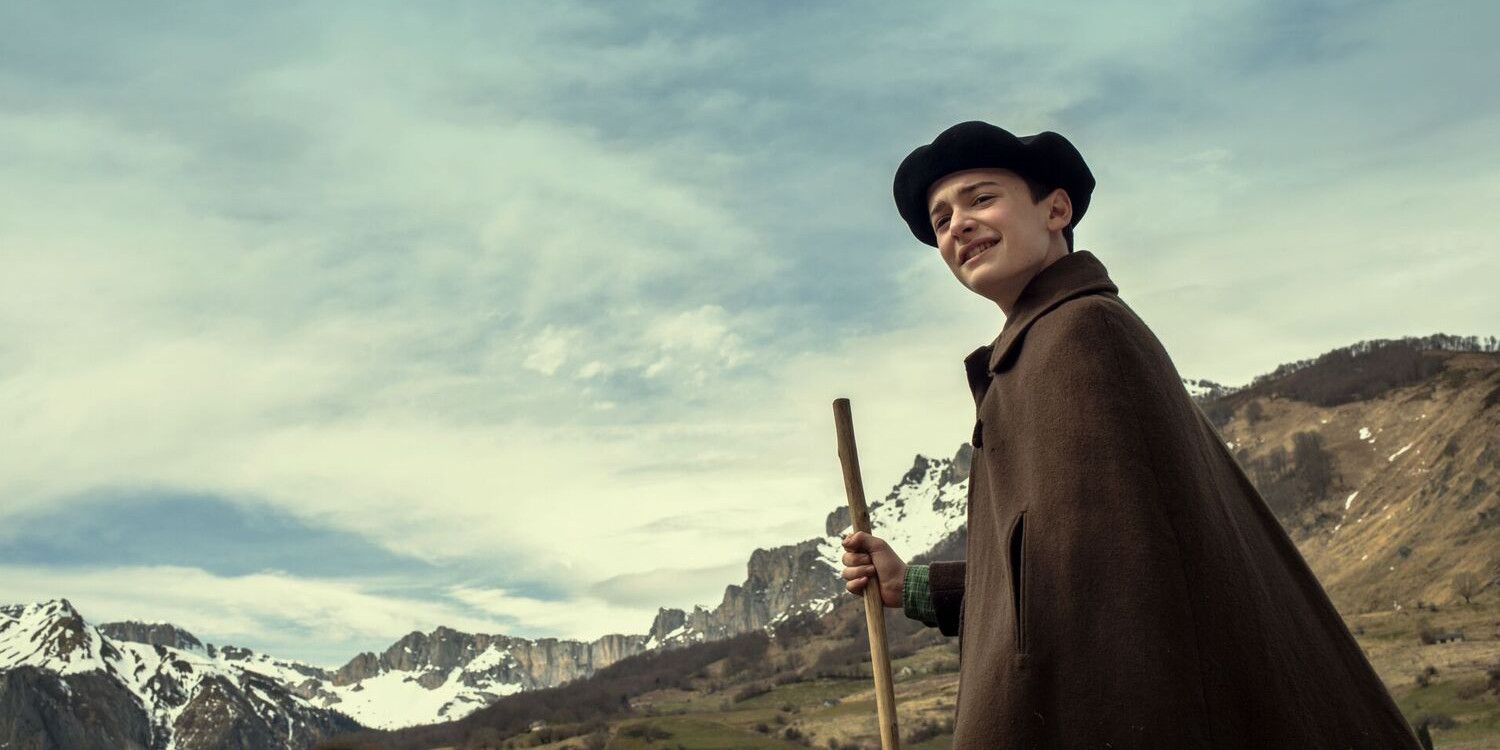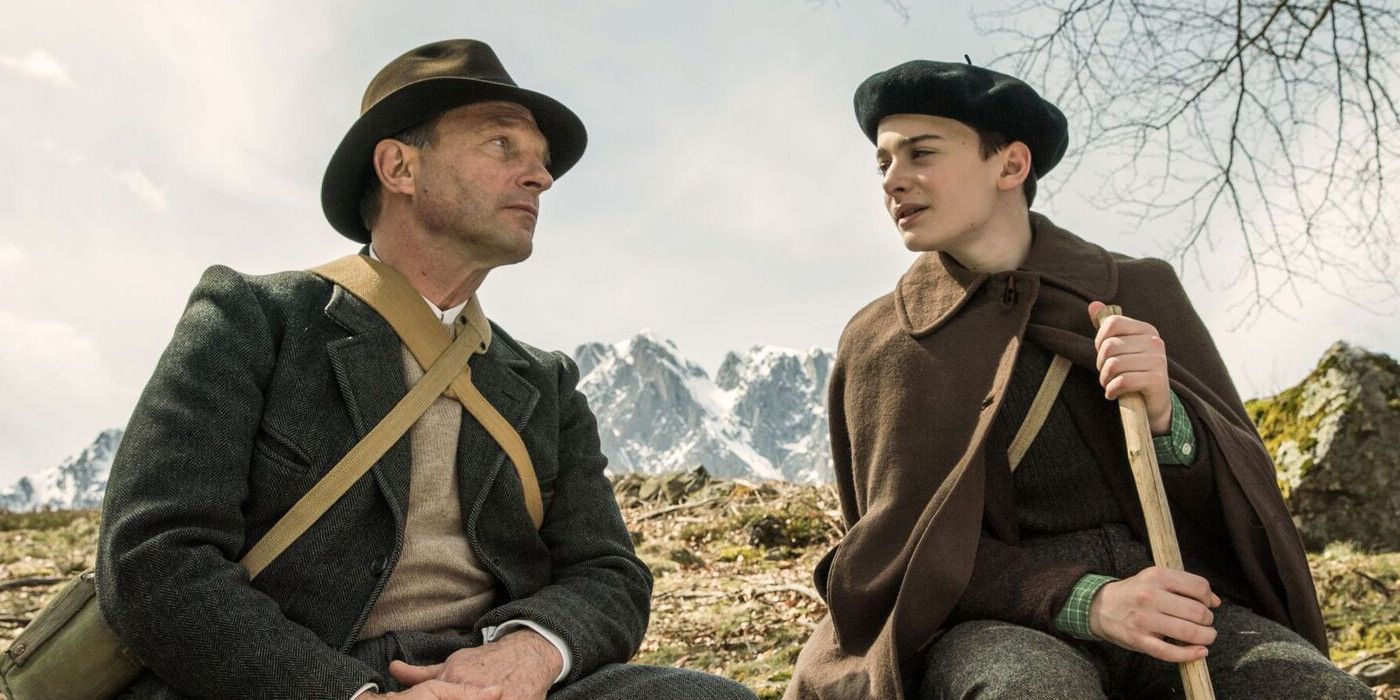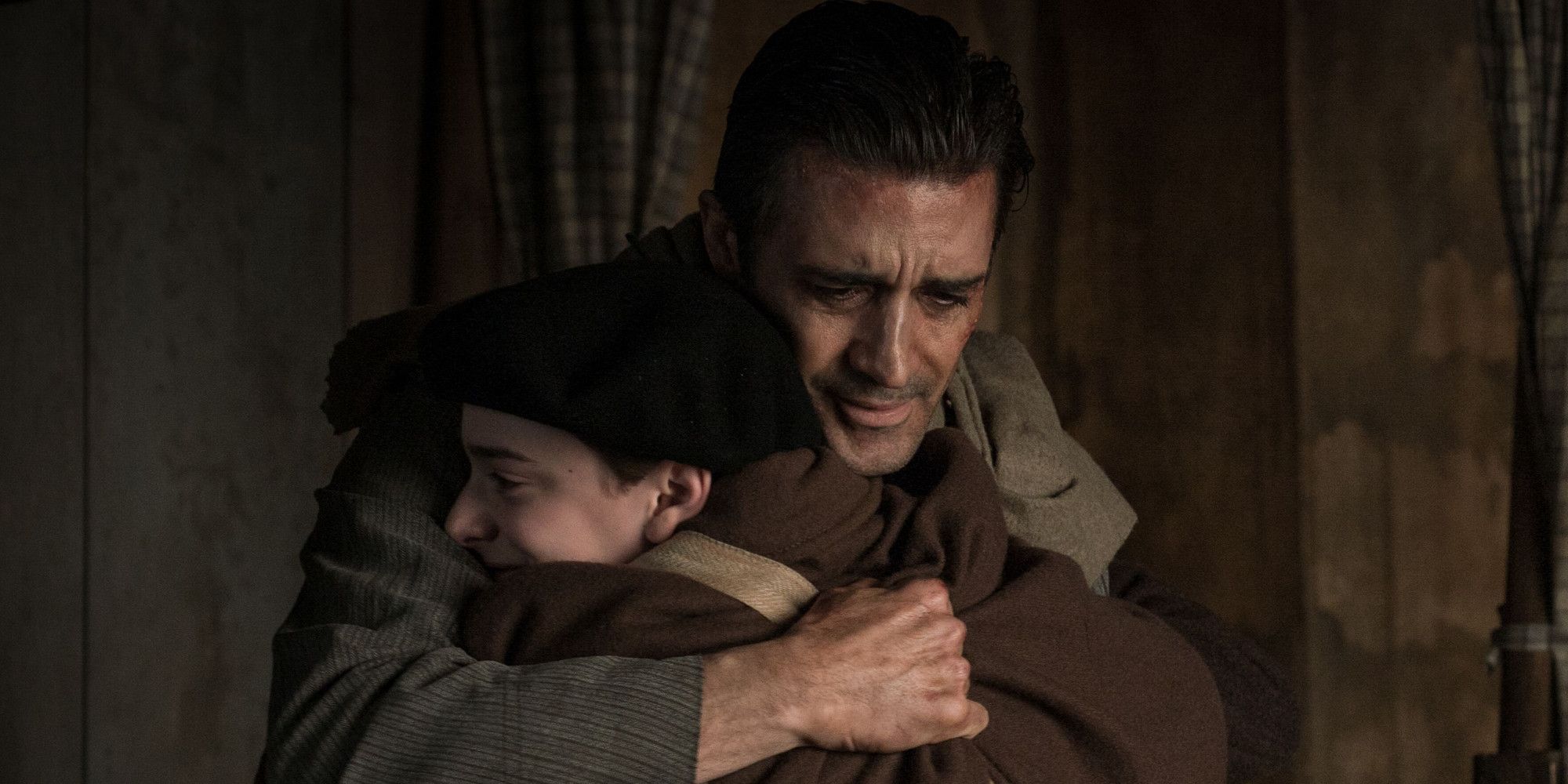In times of hardship, it is often too easy to overlook the tinier instances of heroism and bravery that, in so many ways, have an immeasurable impact on human lives. Waiting for Anya, Ben Cookson's sophomore feature, depicts one such act. Based on the children's novel by Michael Morpurgo, the film follows Jo (Noah Schnapp), a young shepherd, who opts to help his neighbor smuggle Jewish children across the border of southern France into Spain. Before the film's limited theatrical run on February 7, Screen Rant had the opportunity of speaking with its star, Noah Schnapp, about his experience working on the project.
How was this project introduced to you and what made you want to be a part of it?
Noah Schnapp: I mean it just came my way like any other film project. I read the script and I was really excited about it, especially because it's surrounded around a Jewish character and I myself am Jewish. So I really resonated with it and when I told my family about it, they were excited about [the project] too. I was really into it and [filming] in France with amazing actors was very exciting for me.
Was the film offered to you with the idea that Angelica Huston was attached to it because I think that would be a pretty big draw?
Noah Schnapp: Yeah, I think they had all the main actors already cast, so it was very exciting for me seeing all of these [people] be a part of it.
It's funny you call them main actors because you're really the main actor in this film, in that you're both the face of the movie and the driving force of the narrative. How did you handle that responsibility?
Noah Schnapp: It's really exciting to get to be the main character of something. I was on set all the time all day. It was definitely hard work always having to be prepared and being in almost every scene.
But it was definitely worth it and I had a great time. I had so many acting opportunities, and just getting to see the film in its final state was really exciting.
How does that compare to your Stranger Things experience? Because, of course, your career has been defined by that series over the last four or five years. What are the biggest differences in working on a film set and a television set?
Noah Schnapp: I mean, it's kind of the same thing. With TV and Stranger Things, it's more dragged out; it's a lot longer. I would live near set for almost a year, nine months, ten months. And for this, it was faster, more like one month, or two months.
But they're pretty much the same. In Stranger Things, of course, I have all these kids around me and I feel like on a TV show, you're more connected with everyone already. But it's fun getting on a movie set and getting to know everyone. There're pros and cons to everything.
Do you find it easier to do scenes with people you've known for a long time, compared to people you've just met?
Noah Schnapp: Yeah, that's a good question. I definitely think it's easier with someone I've known for a long time obviously because I'm more comfortable with them – especially during deep, emotional scenes, it's definitely easier with someone that I'm connected to. Like in Stranger Things, I've had a lot of emotional scenes with Winona [Ryder] and we're very close. Now that I'm thinking about it, it's definitely easier when you're comfortable around the person.
So how do you prepare for these emotional scenes when you don't know the other actor?
Noah Schnapp: It's always different for whatever the scene asks for but usually, I listen to music before the scene just to get into the mood, mellow myself out and really put myself into the character's shoes. I zone out from everything going on around me and just focus on what I have to do. From there, I just let it happen.
But you have to be comfortable with everything because it's kind of awkward and uncomfortable. Even in Stranger Things, doing these crazy intense scenes and all the eyes are on you and all the lights are shining, you have to be able to zone out and focus on what you're doing.
You're dealing with a very sensitive topic in this film with the Holocaust. What sorts of things did you watch and take in before doing this film?
Noah Schnapp: Just preparing for the movie, I read the book, obviously, which was a great book. And it was actually kind of weird because I remember reading it and realizing it was a children's book, so I was surprised [to find out] how such a deep topic could be turned into a children's book. Then I was wondering how they were going to turn it into a movie, but they did an amzing job.
And I also talked to my parents about it a lot, and because my family is Jewish, we all connected to it in a way.
I wanted to talk about that because your character himself isn't Jewish, but he does help people who are. Though I don't want to say that religion alone defines experience, in the case of the Holocaust, that's sort of true. As a Jewish person, how did you get into the mindset of a World War 2 era character who wasn't Jewish?
Noah Schnapp: It's more of just knowing that during this time period, Judiasim was completely separated from everything else and if you were Jewish, you were a bad person, basically.
It was less of "I'm Jewish," and more of realizing that these religions were very separated. I had to know that going into the room.
It sounds like it would be hard to separate that.
Noah Schnapp: Yeah, it's what acting is. You have to put yourself in someone else's shoes. That's what it is.
Do you find it difficult to stay in this heightened emotional state of mind for extended periods of time?
Noah Schnapp: Yeah, it can be challenging. Emotional scenes can be especially difficult because I'm such a hyper, excited person, so sometimes that can be hard. But that's why I listen to music to mellow myself out and do my best to zone out of what's going on around me.
Sometimes with these scenes, you have to film them over and over and over all day, and it can be so exhausting when they do it at every angle with so many takes. But usually, if I stay in my zone and don't get out of focus, it doesn't take long.
You have another film coming out shortly, Abe, which premiered at last year's Sundance Film Festival. For those of us who weren't at Sundance, what can you tell us about that production?
Noah Schnapp: In that production, I play the main character again and it's more centered around food and culture. It's a coming of age story and the kid in that one, actually, is Jewish. Maybe that pulled me more to the project just because I resonated with that. The whole crew was very diverse; some of them were Brazillian and Muslim, and it was just a really cool project to do.
So maybe it is easier to step into characters that you share attributes with, even though you separate yourself from them?
Noah Schnapp: Yeah, but I also think it's more exciting when I get to play someone who's the polar opposite of me. I'm not always attracted to characters who are similar to me, but in this instance, I was.
What can you say about any other projects coming up?
Noah Schnapp: Well last summer, I filmed an Adam Sandler movie. And that was really exciting because it was a change of pace from what I usually do: it was a comedy and it was really fun to experience new things and learn a lot about something other than drama. Plus, it was a really lighthearted set and I had a good time. That will be coming up sometime soon. And I'll be filming season 4 of Stranger Things here in a few months.
Waiting for Anya will have a limited theatrical release starting on February 7 and will be available On Demand and Digital.



